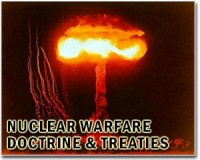| . |  |
. |
Berlin (AFP) Oct 22, 2009 Germany's new ruling coalition will call for US nuclear weapons to be removed from the country's territory, according to a document seen by AFP. The precise make-up of the new German government will become known in the coming days, following negotiations between Chancellor Angela Merkel's conservative Christian Democrats and the pro-business Free Democrats. A copy of the parties' new common programme, which is due to be finalised by the end of the week, said Germany would support US President Barack Obama's call for a world without nuclear weapons. "We will ask the (Atlantic) Alliance and our American allies to withdraw American nuclear weapons from Germany," a copy of the document obtained by AFP said. International disarmament is one of the Free Democrats' key foreign policy positions, and their leader Guido Westerwelle appears to be after the job of foreign minister in the new administration. Merkel's Christian Democrats, by contrast, have opposed all mention of US weapons currently on German soil. Experts believe between 10 and 20 US warheads are currently stored underground in Buchel, in the Rhineland-Palatinate region of south-west Germany. In 2004, around 130 atomic bombs were removed from the Ramstein air base in Rhineland-Palatinate. Merkel ditched her previous coalition partners, the centre-left Social Democrats, following elections on September 27 in favour of a new partnership with the Free Democrats. Negotiations on a common programme have not been plain sailing, with the two blocs at odds over a range of issues, most notably the deep tax cuts and reforms that the Free Democrats promised in their election campaign. Merkel told reporters in Berlin on Sunday she expected coalition talks to reach a conclusion by this weekend.
earlier related report The study by the Asia Society and the University of California flies in the face of the approach by President Barack Obama, who has pushed to toughen sanctions after Pyongyang's string of provocations including a nuclear test. But the experts said the United States should reconsider some positions including dropping its objections to North Korea's entry into the International Monetary Fund, Asian Development Bank and other global financial institutions. "Encouraging a more open and market-friendly economic growth strategy would benefit the North Korean people as a whole and would generate vested interests in continued reform and opening, and a less confrontational foreign policy," the study said. "In other words, economic engagement could change North Korea's perception of its own self-interest," it said. While acknowledging it was not a perfect parallel, the study cited the example of neighboring China, saying that its economic transformation has helped moderate the developing giant's foreign policy. The project was led in part by Charles Kartman, a former top US diplomat for East Asia who headed the Korean Peninsula Economic Development Organization, set up to implement a 1994 denuclearization pact that has since collapsed. Other authors include John Delury, associate director of the Center on US-China Relations at the New York-based Asia Society, and Susan Shirk, director of the University of California's Institute on Global Conflict and Cooperation. Obama administration officials have vowed to be hard-nosed on North Korea, joining many conservatives in pledging not to "reward" the communist state for violating past agreements. But the study said the Obama administration should follow its own precedent in cases such as Iran and Myanmar, with which the United States has offered talks while also maintaining sanctions. Engagement "can complement our bargaining with North Korea in the short run, and in the long run have a positive influence on the environment in which Pyongyang makes calculations about the costs and benefits of its nuclear weapons and missile programs," the study said. Share This Article With Planet Earth
Related Links Learn about nuclear weapons doctrine and defense at SpaceWar.com Learn about missile defense at SpaceWar.com All about missiles at SpaceWar.com Learn about the Superpowers of the 21st Century at SpaceWar.com
 Calls for nuclear weapons in South Korea
Calls for nuclear weapons in South KoreaSeoul (UPI) Oct 21, 2009 With the U.S. defense chief in Seoul for security talks, a group of scholars and retired military officials have called for a redeployment of tactical nuclear weapons in South Korea to counter North Korea's nuclear drive. They also urged the United States to delay the planned transfer of wartime control of South Korean troops to Seoul beyond 2012, citing lingering threats from the North ... read more |
|
| The content herein, unless otherwise known to be public domain, are Copyright 1995-2009 - SpaceDaily. AFP and UPI Wire Stories are copyright Agence France-Presse and United Press International. ESA Portal Reports are copyright European Space Agency. All NASA sourced material is public domain. Additional copyrights may apply in whole or part to other bona fide parties. Advertising does not imply endorsement,agreement or approval of any opinions, statements or information provided by SpaceDaily on any Web page published or hosted by SpaceDaily. Privacy Statement |